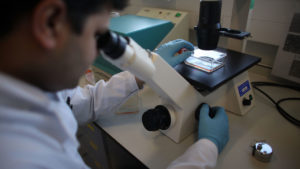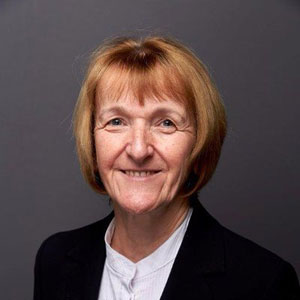Science, Technology, Engineering and Mathematics (STEM) subjects are integral to the UK’s economic success but only 17% of the STEM workforce is female.
To encourage girls to think about a career in science, Dr Nicola Cumley, Clinical Scientist at the SRMRC, ran a workshop session at ‘Skirting Science’, an initiative set up by Soroptimist International to bring together science professionals and girls.
A report of her workshop has been published in the Royal College of Pathologists bulletin.
Dr Cumley explained: “Having had my confidence boosted by an excellent science communication training session run by the College, I ran a workshop session at ‘Skirting Science.’
“This day-long event consists of a variety of workshops aimed at girls in Year 9 (aged 13–14) to get them enthused about science.
“My workshop idea arose from a question that I had seen on past exam papers while revising for my Masters in clinical microbiology. The question was something along the lines of designing an organism that could be a biological warfare weapon. It was suggested to me that this was not appropriate, so the idea became to ‘design the ultimate disease causing micro-organism’.”
Dr Cumley started by encouraging the girls to talk to each other about infectious diseases, using a modified activity from the Health Protection Agency’s E-bug resource. She then initiated a group discussion regarding characteristics that might be important for an organism to spread and survive. This was loosely structured around the chain of infection.
Dr Cumley added: “I provided a set of cards categorised into organism, mode of transmission, symptoms, population at risk, outcome and a list of additional characteristics. On each of these were ten options.
“To create their pathogen, the girls choose the characteristics from each category that they thought would be successful. Once they had made their decisions, we ‘released’ each pathogen into an environment or social situation, including a school, office, field and aeroplane. We discussed as a group how successful we thought they would be in that situation.”
The group then furthered the discussion by talking about how disease can affect the social aspects of society, such as leaving people unable to work, in addition to issues of immunity and transmission of disease.
“I was very impressed at how engaged the students became and the thought processes that they put into their bugs,” said Dr Cumley. “I would encourage anyone who is passionate about their specialty and likes talking to give outreach events such as this a try.”
If you would like to speak to Dr Cumley, or one of the other SRMRC team, about running a workshop such as this in your organisation, please contact Rosie or Hannah on 0121 371 4223.




